人教版必修5 Unit 5 First aid grammar课件(38张PPT)
文档属性
| 名称 | 人教版必修5 Unit 5 First aid grammar课件(38张PPT) |  | |
| 格式 | zip | ||
| 文件大小 | 613.0KB | ||
| 资源类型 | 教案 | ||
| 版本资源 | 人教版(新课程标准) | ||
| 科目 | 英语 | ||
| 更新时间 | 2020-08-20 18:23:46 | ||
图片预览

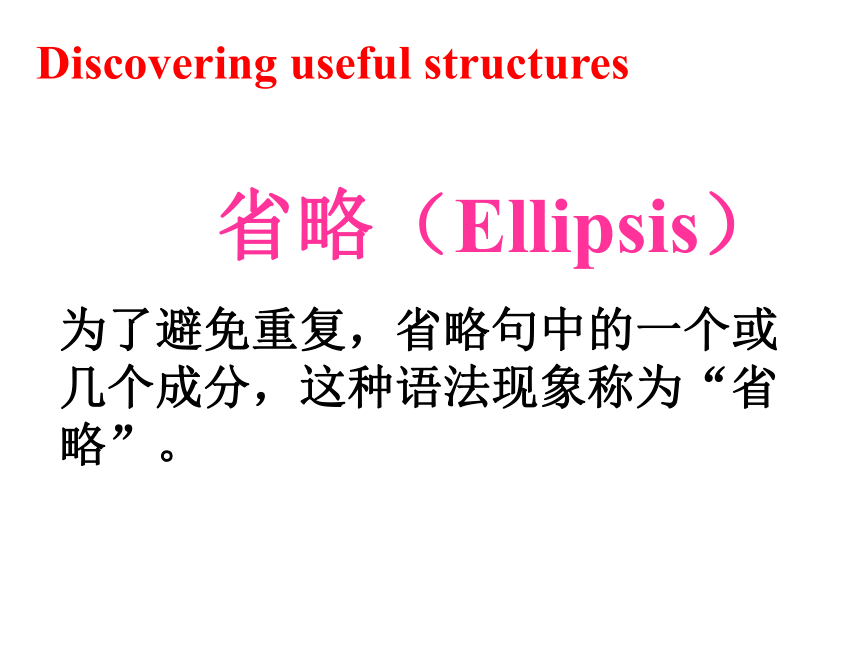
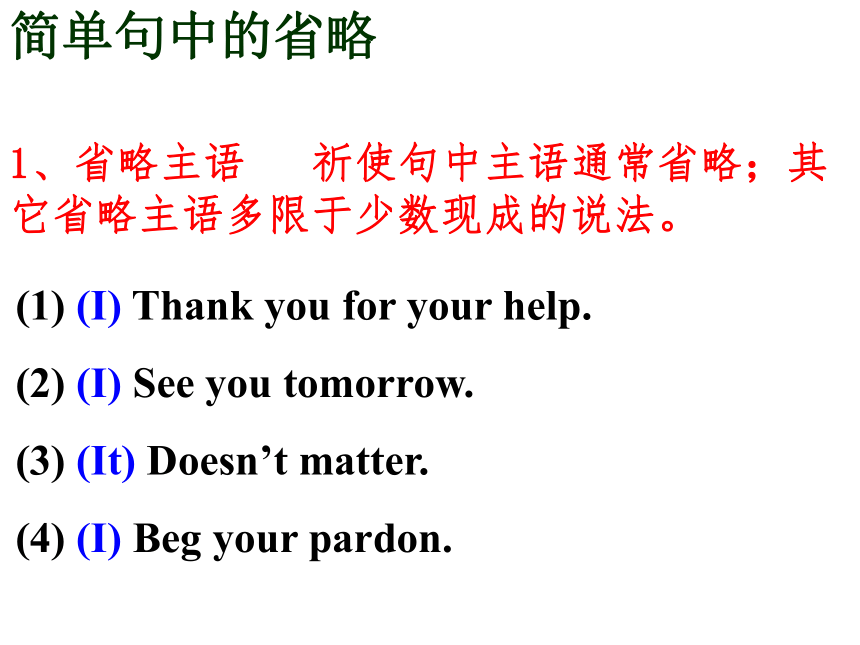
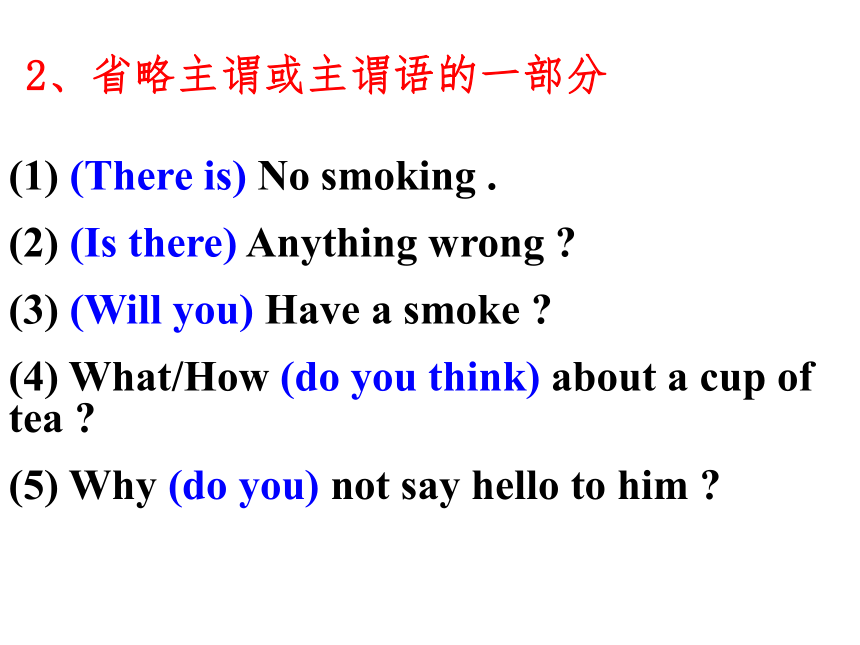
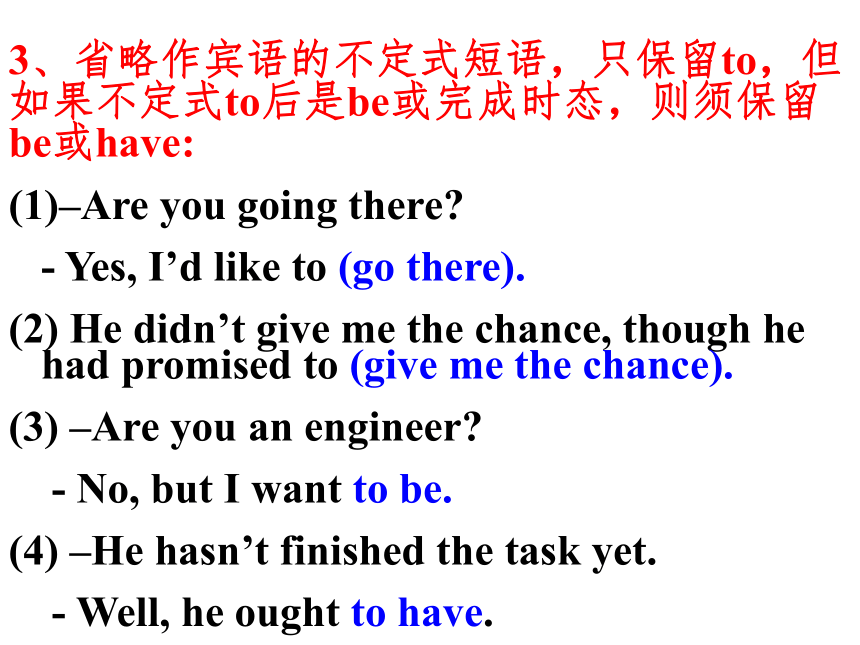
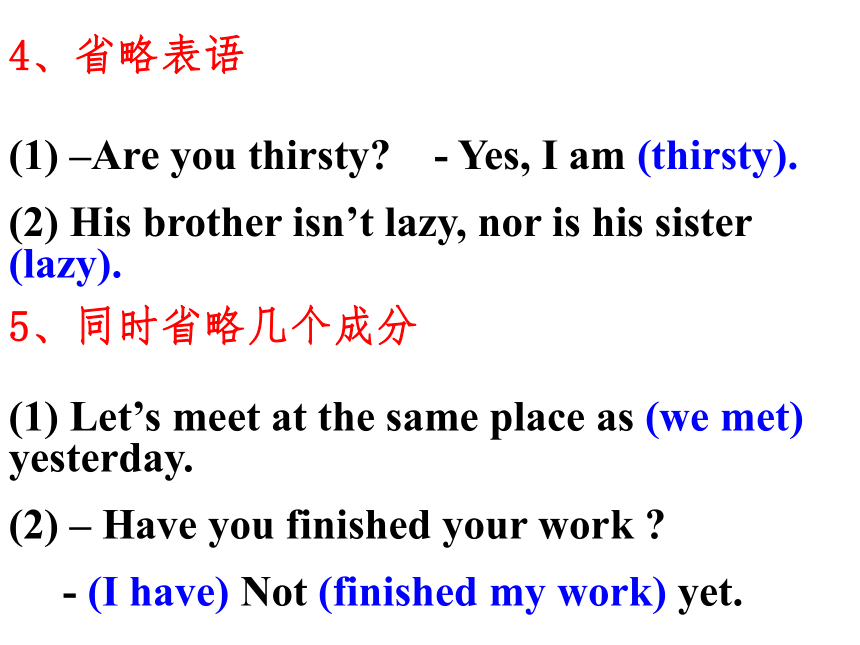
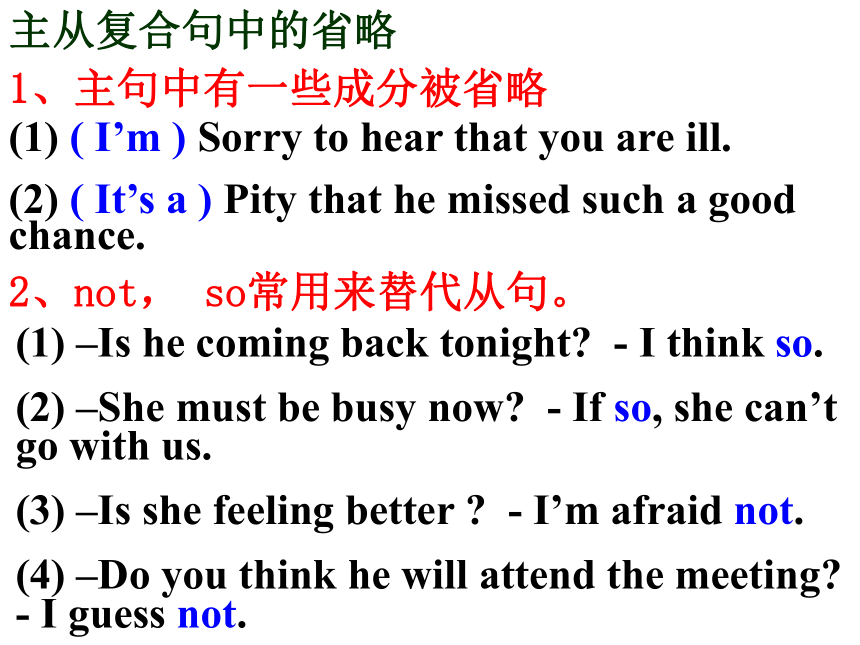
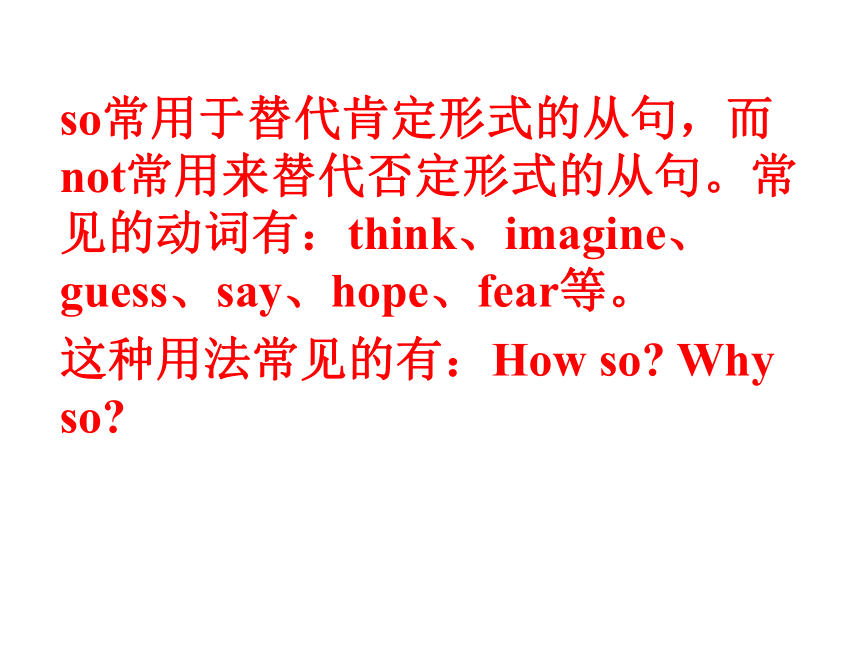
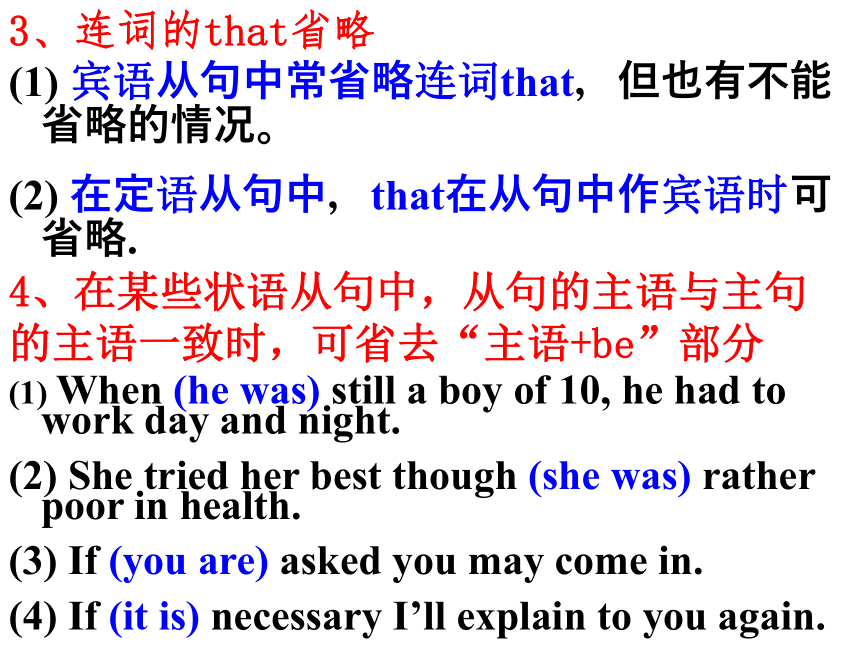
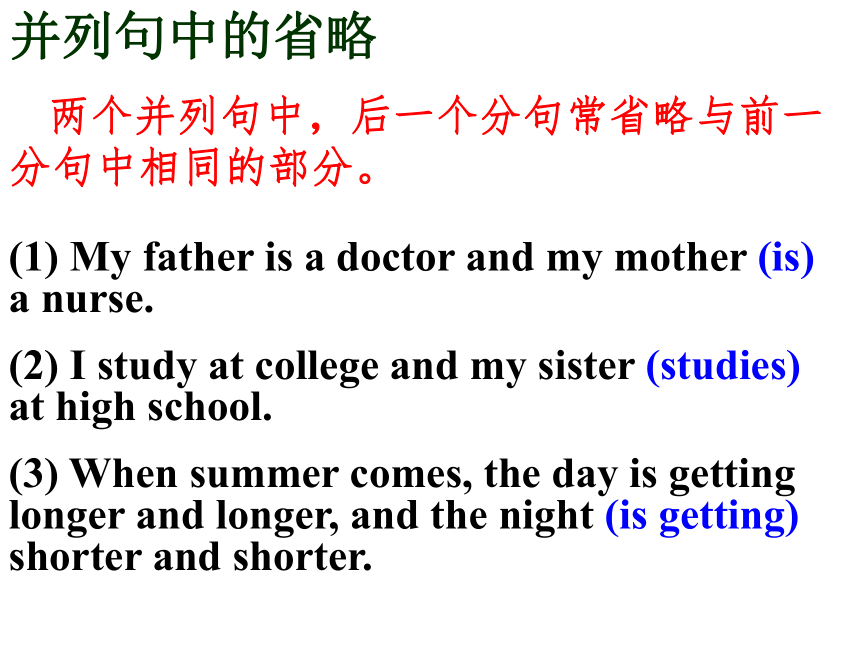

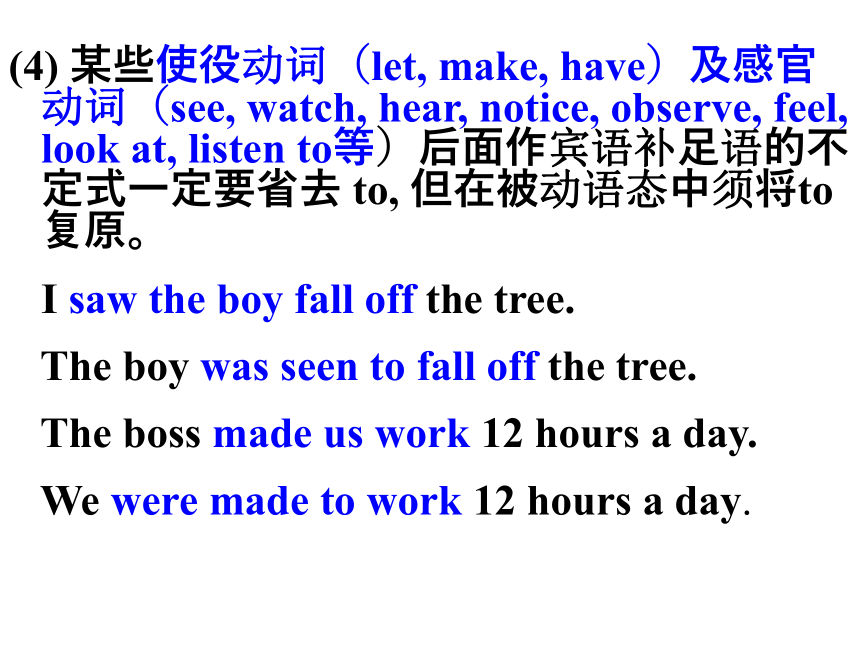
文档简介
(共38张PPT)
人教新课标必修五
Unit
5
First
aid
省略(Ellipsis)
为了避免重复,省略句中的一个或几个成分,这种语法现象称为“省略”。
Discovering
useful
structures
简单句中的省略
1、省略主语
祈使句中主语通常省略;其它省略主语多限于少数现成的说法。
(1)
(I)
Thank
you
for
your
help.
(2)
(I)
See
you
tomorrow.
(3)
(It)
Doesn’t
matter.
(4)
(I)
Beg
your
pardon.
2、省略主谓或主谓语的一部分
(1)
(There
is)
No
smoking
.
(2)
(Is
there)
Anything
wrong
?
(3)
(Will
you)
Have
a
smoke
?
(4)
What/How
(do
you
think)
about
a
cup
of
tea
?
(5)
Why
(do
you)
not
say
hello
to
him
?
3、省略作宾语的不定式短语,只保留to,但如果不定式to后是be或完成时态,则须保留be或have:
–Are
you
going
there?
-
Yes,
I’d
like
to
(go
there).
(2)
He
didn’t
give
me
the
chance,
though
he
had
promised
to
(give
me
the
chance).
(3)
–Are
you
an
engineer?
-
No,
but
I
want
to
be.
(4)
–He
hasn’t
finished
the
task
yet.
-
Well,
he
ought
to
have.
4、省略表语
(1)
–Are
you
thirsty?
-
Yes,
I
am
(thirsty).
(2)
His
brother
isn’t
lazy,
nor
is
his
sister
(lazy).
5、同时省略几个成分
(1)
Let’s
meet
at
the
same
place
as
(we
met)
yesterday.
(2)
–
Have
you
finished
your
work
?
-
(I
have)
Not
(finished
my
work)
yet.
主从复合句中的省略
1、主句中有一些成分被省略
(1)
(
I’m
)
Sorry
to
hear
that
you
are
ill.
(2)
(
It’s
a
)
Pity
that
he
missed
such
a
good
chance.
2、not,
so常用来替代从句。
(1)
–Is
he
coming
back
tonight?
-
I
think
so.
(2)
–She
must
be
busy
now?
-
If
so,
she
can’t
go
with
us.
(3)
–Is
she
feeling
better
?
-
I’m
afraid
not.
(4)
–Do
you
think
he
will
attend
the
meeting?
-
I
guess
not.
so常用于替代肯定形式的从句,而not常用来替代否定形式的从句。常见的动词有:think、imagine、guess、say、hope、fear等。
这种用法常见的有:How
so?
Why
so?
3、连词的that省略
(1)
宾语从句中常省略连词that,但也有不能省略的情况。
(2)
在定语从句中,that在从句中作宾语时可省略.
4、在某些状语从句中,从句的主语与主句的主语一致时,可省去“主语+be”部分
When
(he
was)
still
a
boy
of
10,
he
had
to
work
day
and
night.
She
tried
her
best
though
(she
was)
rather
poor
in
health.
If
(you
are)
asked
you
may
come
in.
If
(it
is)
necessary
I’ll
explain
to
you
again.
并列句中的省略
两个并列句中,后一个分句常省略与前一分句中相同的部分。
(1)
My
father
is
a
doctor
and
my
mother
(is)
a
nurse.
(2)
I
study
at
college
and
my
sister
(studies)
at
high
school.
(3)
When
summer
comes,
the
day
is
getting
longer
and
longer,
and
the
night
(is
getting)
shorter
and
shorter.
其他省略
1、不定式符号to的省略
并列的不定式可省去后面的
to.
I
told
him
to
sit
down
and
wait
for
a
moment.
(2)
help
当“帮助”讲时,后面的宾语或宾补的不定式符号to可带可不带.
I
will
help
(to)
do
it
for
you.
I
will
help
you
(to)
do
it.
(3)介词but前若有动词do,后面的不定式不带
to.
The
boy
did
nothing
but
play.
(4)
某些使役动词(let,
make,
have)及感官动词(see,
watch,
hear,
notice,
observe,
feel,
look
at,
listen
to等)后面作宾语补足语的不定式一定要省去
to,
但在被动语态中须将to
复原。
I
saw
the
boy
fall
off
the
tree.
The
boy
was
seen
to
fall
off
the
tree.
The
boss
made
us
work
12
hours
a
day.
We
were
made
to
work
12
hours
a
day.
(5)
主语从句中有动词do,后面作表语的不定式的
to可带可不带。
All
we
can
do
now
is
(to)
wait.
What
we
can
do
now
is
(to)
wait.
(6)
find
当“发现”讲时,后面作宾语补足语的不定式符号to可带可不带。
We
found
him
(to)
work
very
hard
at
the
experiment.
但如果是不定式
to
be,则不能省略。
She
found
him
to
be
dishonest.
2、连词if在部分虚拟条件句中可省略,但后面的语序有变化。
(1)
Had
they
time,
they
would
certainly
come
and
help
us.
(2)
Were
I
you,
I
would
do
the
work
better.
(3)Should
there
be
a
flood,
what
should
we
do?
3、主句和从句各有一些成分省略。
The
sooner
(you
do
it),
the
better
(it
will
be).
(I)
Beg
your
pardon.
(It)
Sounds
like
a
good
idea.
(Is)
Anybody
here?
(Is
there)
Anything
I
can
do
for
you?
A:
Where
has
Mr.
Smith
gone?
B:
Sorry,
I
don’t
know
(where
he
has
gone.)
省略主语
省略谓语或谓语的一部分
省略宾语
为了使语言简洁或避免重复,省略句中的一个或几个句子成分,这种语法现象称为省略。
(Are
you)
Hungry?
(I
want)
Orange
juice,
please.
A:
Would
you
like
to
come
to
the
party?
B:
I’d
love
to
(come
the
party.)
省略主语
和谓语
省略不定式后省略动词
Can
you
find
at
least
three
sentences
with
ellipsis
from
the
Warming
Up
and
the
Reading?
Write
down
the
sentences
you
found
below.
1
Often
the
illness
or
injury
is
not
serious,
but
there
are
other
times
when
(the
illness
or
injury
is
serious
and
)
giving
first
aid
quickly
can
save
lives.
Burns
are
called
first
(degree
burns),
second
(degree
burns)
or
third
degree
burns
…
These
affect
both
the
top
(layer
of
the
skin)
and
the
second
layer
of
the
skin.
In
groups,
look
at
these
pairs
of
sentences.
Discuss
the
difference
between
A
and
B
in
each
pair.
Also
discuss
which
is
the
better
sentence
and
why.
2
The
difference
between
sentence
A
and
B:
●
There
are
lots
of
repeated
words
and
phrases
in
sentence
A.
●
Sentence
B
is
better
than
Sentence
A
because
it
doesn’t
have
unnecessary
repetition
in
it,
and
it
is
easier
to
understand
and
it
sounds
much
less
awkward
than
sentence
A.
3
Rewrite
these
sentences
by
taking
out
the
unnecessary
parts.
The
burn
that
she
got
from
the
iron
was
red
and
it
was
very
painful.
A
boy
was
on
the
left
side
of
the
sick
woman,
and
a
girl
was
on
the
right
side
of
the
sick
woman
(
)
______).
(____
3.
She
has
a
daughter
who
is
in
hospital.
4.
He
went
to
the
doctor
because
he
had
to
go
to
the
doctor
.
5.
Did
she
pass
the
first
aid
test
that
she
did
yesterday
or
didn’t
she
pass?
(
)
(
)
(
)
not
6.
She
could
not
decided
whether
to
send
him
to
hospital
or
not
to
send
him
to
hospital.
7.
When
your
nose
is
bleeding,
you
should
bend
forward
so
that
the
blood
runs
out
of
your
nose
and
the
blood
doesn’t
run
down
your
throat.
8.
Only
some
of
the
students
have
done
a
first
aid
course
but
most
of
the
students
haven’t
done
a
first
aid
course.
not
These
sentences
are
correct.
However,
one
or
more
words
have
been
left
out.
Can
you
tell
your
partner
which
words
are
missing
?
4
1
The
temple
surrounded
by
a
wall
belongs
to
the
local
government.
The
temple
(which
is)
surrounded
by
a
wall
belongs
to
the
local
government.
2)?The
first
book
I
read
this
term
was
more
interesting
than
the
second.
The
first
book
(that)
I
read
this
term
was
more
interesting
than
the
second
(book
that
I
read
this
term).
定语从句中的省略
3
To
her
teacher’s
surprise,
she
did
better
in
her
first
aid
exam
than
expected.
??
To
her
teacher’s
surprise,
she
did
better
in
her
first
aid
exam
than
(she
was)
expected
(to
do).
在than,
as引导的比较状语从句中的省略
4
I
don’t
think
they
have
returned
from
the
hospital,
but
they
might
have.
I
don’t
think
they
have
returned
from
the
hospital,
but
they
might
have
(returned
from
the
hospital).
在并列中,后面分句中与前面分句中相同的部分常可省略
?
5
He
wanted
to
help
the
accident
victim
but
his
friend
didn’t.
He
wanted
to
help
the
accident
victim
but
his
friend
didn’t
(want
to
help
the
accident
victim).
在并列中,后面分句中与前面分句中相同的部分常可省略
??
6
You
can
borrow
my
first
aid
notes
if
you
want
to.
You
can
borrow
my
first
aid
notes
if
you
want
to
(borrow
my
first
aid
notes).
不定式后省略动词
??
7
Sounds
like
a
good
idea.
(It)
sounds
like
a
good
idea.
??
8
Anything
I
can
do
for
you?
(Is
there)
anything
I
can
do
for
you?
Do
practice
on
page
71
Ex.
1
,
2
and
3
Using
structures
on
page
71
It’s
still
bleeding
and
very
painful.
Yes,
I’d
love
you
to
.
Yes,
I’ll
do
it
now.
Yes,
let’s
do
that.
No,
I
don’t
think
so.
Answer
key
for
Exercise
1
I
beg
your
pardon?
I
haven’t
seen
you
for
ages.
I’m
sorry
to
hear
that.
Are
you
coming
swimming?
Have
you
found
her
telephone
number
yet?
Answer
key
for
Exercise
2
6.
Would
you
like
some
more
tea?/
Do
you
want
some
more
tea?
7.
It
doesn’t
matter.
8.
It’s
a
pity
that
you
couldn’t
come.
9.
That/
It
sounds
fine
to
me.
10.
What
terrible
weather
it
is!
JENNY:
I’ve
heard
there’s
a
ghost
in
this
castle
that
comes
out
in
the
middle
of
the
day.
RALPH:
Really?
Are
you
sure?
JENNY:
Well,
this
one’s
a
queen.
She
was
very
young
and
her
husband,
the
king,
was
very
old.
He
saw
her
dancing
with
a
young
man
of
the
court.
Suggested
answers
to
Exercise
3
RALPH:
Dancing
with
a
young
man!
Oh
dear!
JENNY:
Well,
the
king
didn’t
like
it
so
he
had
her
killed.
RALPH:
Had
her
killed!
So
cruel!
JENNY:
They
say
that
it’s
her
ghost
running
to
the
king
to
ask
him
to
forgive
her.
RALPH:
Have
you
seen
it?
JENNY:
No,
never,
but
I’ve
met
people
who
say
they
have.
RALPH:
Well,
I
don’t
believe
in
ghosts
but
it’s
good
story
to
frighten
people
who
do!
人教新课标必修五
Unit
5
First
aid
省略(Ellipsis)
为了避免重复,省略句中的一个或几个成分,这种语法现象称为“省略”。
Discovering
useful
structures
简单句中的省略
1、省略主语
祈使句中主语通常省略;其它省略主语多限于少数现成的说法。
(1)
(I)
Thank
you
for
your
help.
(2)
(I)
See
you
tomorrow.
(3)
(It)
Doesn’t
matter.
(4)
(I)
Beg
your
pardon.
2、省略主谓或主谓语的一部分
(1)
(There
is)
No
smoking
.
(2)
(Is
there)
Anything
wrong
?
(3)
(Will
you)
Have
a
smoke
?
(4)
What/How
(do
you
think)
about
a
cup
of
tea
?
(5)
Why
(do
you)
not
say
hello
to
him
?
3、省略作宾语的不定式短语,只保留to,但如果不定式to后是be或完成时态,则须保留be或have:
–Are
you
going
there?
-
Yes,
I’d
like
to
(go
there).
(2)
He
didn’t
give
me
the
chance,
though
he
had
promised
to
(give
me
the
chance).
(3)
–Are
you
an
engineer?
-
No,
but
I
want
to
be.
(4)
–He
hasn’t
finished
the
task
yet.
-
Well,
he
ought
to
have.
4、省略表语
(1)
–Are
you
thirsty?
-
Yes,
I
am
(thirsty).
(2)
His
brother
isn’t
lazy,
nor
is
his
sister
(lazy).
5、同时省略几个成分
(1)
Let’s
meet
at
the
same
place
as
(we
met)
yesterday.
(2)
–
Have
you
finished
your
work
?
-
(I
have)
Not
(finished
my
work)
yet.
主从复合句中的省略
1、主句中有一些成分被省略
(1)
(
I’m
)
Sorry
to
hear
that
you
are
ill.
(2)
(
It’s
a
)
Pity
that
he
missed
such
a
good
chance.
2、not,
so常用来替代从句。
(1)
–Is
he
coming
back
tonight?
-
I
think
so.
(2)
–She
must
be
busy
now?
-
If
so,
she
can’t
go
with
us.
(3)
–Is
she
feeling
better
?
-
I’m
afraid
not.
(4)
–Do
you
think
he
will
attend
the
meeting?
-
I
guess
not.
so常用于替代肯定形式的从句,而not常用来替代否定形式的从句。常见的动词有:think、imagine、guess、say、hope、fear等。
这种用法常见的有:How
so?
Why
so?
3、连词的that省略
(1)
宾语从句中常省略连词that,但也有不能省略的情况。
(2)
在定语从句中,that在从句中作宾语时可省略.
4、在某些状语从句中,从句的主语与主句的主语一致时,可省去“主语+be”部分
When
(he
was)
still
a
boy
of
10,
he
had
to
work
day
and
night.
She
tried
her
best
though
(she
was)
rather
poor
in
health.
If
(you
are)
asked
you
may
come
in.
If
(it
is)
necessary
I’ll
explain
to
you
again.
并列句中的省略
两个并列句中,后一个分句常省略与前一分句中相同的部分。
(1)
My
father
is
a
doctor
and
my
mother
(is)
a
nurse.
(2)
I
study
at
college
and
my
sister
(studies)
at
high
school.
(3)
When
summer
comes,
the
day
is
getting
longer
and
longer,
and
the
night
(is
getting)
shorter
and
shorter.
其他省略
1、不定式符号to的省略
并列的不定式可省去后面的
to.
I
told
him
to
sit
down
and
wait
for
a
moment.
(2)
help
当“帮助”讲时,后面的宾语或宾补的不定式符号to可带可不带.
I
will
help
(to)
do
it
for
you.
I
will
help
you
(to)
do
it.
(3)介词but前若有动词do,后面的不定式不带
to.
The
boy
did
nothing
but
play.
(4)
某些使役动词(let,
make,
have)及感官动词(see,
watch,
hear,
notice,
observe,
feel,
look
at,
listen
to等)后面作宾语补足语的不定式一定要省去
to,
但在被动语态中须将to
复原。
I
saw
the
boy
fall
off
the
tree.
The
boy
was
seen
to
fall
off
the
tree.
The
boss
made
us
work
12
hours
a
day.
We
were
made
to
work
12
hours
a
day.
(5)
主语从句中有动词do,后面作表语的不定式的
to可带可不带。
All
we
can
do
now
is
(to)
wait.
What
we
can
do
now
is
(to)
wait.
(6)
find
当“发现”讲时,后面作宾语补足语的不定式符号to可带可不带。
We
found
him
(to)
work
very
hard
at
the
experiment.
但如果是不定式
to
be,则不能省略。
She
found
him
to
be
dishonest.
2、连词if在部分虚拟条件句中可省略,但后面的语序有变化。
(1)
Had
they
time,
they
would
certainly
come
and
help
us.
(2)
Were
I
you,
I
would
do
the
work
better.
(3)Should
there
be
a
flood,
what
should
we
do?
3、主句和从句各有一些成分省略。
The
sooner
(you
do
it),
the
better
(it
will
be).
(I)
Beg
your
pardon.
(It)
Sounds
like
a
good
idea.
(Is)
Anybody
here?
(Is
there)
Anything
I
can
do
for
you?
A:
Where
has
Mr.
Smith
gone?
B:
Sorry,
I
don’t
know
(where
he
has
gone.)
省略主语
省略谓语或谓语的一部分
省略宾语
为了使语言简洁或避免重复,省略句中的一个或几个句子成分,这种语法现象称为省略。
(Are
you)
Hungry?
(I
want)
Orange
juice,
please.
A:
Would
you
like
to
come
to
the
party?
B:
I’d
love
to
(come
the
party.)
省略主语
和谓语
省略不定式后省略动词
Can
you
find
at
least
three
sentences
with
ellipsis
from
the
Warming
Up
and
the
Reading?
Write
down
the
sentences
you
found
below.
1
Often
the
illness
or
injury
is
not
serious,
but
there
are
other
times
when
(the
illness
or
injury
is
serious
and
)
giving
first
aid
quickly
can
save
lives.
Burns
are
called
first
(degree
burns),
second
(degree
burns)
or
third
degree
burns
…
These
affect
both
the
top
(layer
of
the
skin)
and
the
second
layer
of
the
skin.
In
groups,
look
at
these
pairs
of
sentences.
Discuss
the
difference
between
A
and
B
in
each
pair.
Also
discuss
which
is
the
better
sentence
and
why.
2
The
difference
between
sentence
A
and
B:
●
There
are
lots
of
repeated
words
and
phrases
in
sentence
A.
●
Sentence
B
is
better
than
Sentence
A
because
it
doesn’t
have
unnecessary
repetition
in
it,
and
it
is
easier
to
understand
and
it
sounds
much
less
awkward
than
sentence
A.
3
Rewrite
these
sentences
by
taking
out
the
unnecessary
parts.
The
burn
that
she
got
from
the
iron
was
red
and
it
was
very
painful.
A
boy
was
on
the
left
side
of
the
sick
woman,
and
a
girl
was
on
the
right
side
of
the
sick
woman
(
)
______).
(____
3.
She
has
a
daughter
who
is
in
hospital.
4.
He
went
to
the
doctor
because
he
had
to
go
to
the
doctor
.
5.
Did
she
pass
the
first
aid
test
that
she
did
yesterday
or
didn’t
she
pass?
(
)
(
)
(
)
not
6.
She
could
not
decided
whether
to
send
him
to
hospital
or
not
to
send
him
to
hospital.
7.
When
your
nose
is
bleeding,
you
should
bend
forward
so
that
the
blood
runs
out
of
your
nose
and
the
blood
doesn’t
run
down
your
throat.
8.
Only
some
of
the
students
have
done
a
first
aid
course
but
most
of
the
students
haven’t
done
a
first
aid
course.
not
These
sentences
are
correct.
However,
one
or
more
words
have
been
left
out.
Can
you
tell
your
partner
which
words
are
missing
?
4
1
The
temple
surrounded
by
a
wall
belongs
to
the
local
government.
The
temple
(which
is)
surrounded
by
a
wall
belongs
to
the
local
government.
2)?The
first
book
I
read
this
term
was
more
interesting
than
the
second.
The
first
book
(that)
I
read
this
term
was
more
interesting
than
the
second
(book
that
I
read
this
term).
定语从句中的省略
3
To
her
teacher’s
surprise,
she
did
better
in
her
first
aid
exam
than
expected.
??
To
her
teacher’s
surprise,
she
did
better
in
her
first
aid
exam
than
(she
was)
expected
(to
do).
在than,
as引导的比较状语从句中的省略
4
I
don’t
think
they
have
returned
from
the
hospital,
but
they
might
have.
I
don’t
think
they
have
returned
from
the
hospital,
but
they
might
have
(returned
from
the
hospital).
在并列中,后面分句中与前面分句中相同的部分常可省略
?
5
He
wanted
to
help
the
accident
victim
but
his
friend
didn’t.
He
wanted
to
help
the
accident
victim
but
his
friend
didn’t
(want
to
help
the
accident
victim).
在并列中,后面分句中与前面分句中相同的部分常可省略
??
6
You
can
borrow
my
first
aid
notes
if
you
want
to.
You
can
borrow
my
first
aid
notes
if
you
want
to
(borrow
my
first
aid
notes).
不定式后省略动词
??
7
Sounds
like
a
good
idea.
(It)
sounds
like
a
good
idea.
??
8
Anything
I
can
do
for
you?
(Is
there)
anything
I
can
do
for
you?
Do
practice
on
page
71
Ex.
1
,
2
and
3
Using
structures
on
page
71
It’s
still
bleeding
and
very
painful.
Yes,
I’d
love
you
to
.
Yes,
I’ll
do
it
now.
Yes,
let’s
do
that.
No,
I
don’t
think
so.
Answer
key
for
Exercise
1
I
beg
your
pardon?
I
haven’t
seen
you
for
ages.
I’m
sorry
to
hear
that.
Are
you
coming
swimming?
Have
you
found
her
telephone
number
yet?
Answer
key
for
Exercise
2
6.
Would
you
like
some
more
tea?/
Do
you
want
some
more
tea?
7.
It
doesn’t
matter.
8.
It’s
a
pity
that
you
couldn’t
come.
9.
That/
It
sounds
fine
to
me.
10.
What
terrible
weather
it
is!
JENNY:
I’ve
heard
there’s
a
ghost
in
this
castle
that
comes
out
in
the
middle
of
the
day.
RALPH:
Really?
Are
you
sure?
JENNY:
Well,
this
one’s
a
queen.
She
was
very
young
and
her
husband,
the
king,
was
very
old.
He
saw
her
dancing
with
a
young
man
of
the
court.
Suggested
answers
to
Exercise
3
RALPH:
Dancing
with
a
young
man!
Oh
dear!
JENNY:
Well,
the
king
didn’t
like
it
so
he
had
her
killed.
RALPH:
Had
her
killed!
So
cruel!
JENNY:
They
say
that
it’s
her
ghost
running
to
the
king
to
ask
him
to
forgive
her.
RALPH:
Have
you
seen
it?
JENNY:
No,
never,
but
I’ve
met
people
who
say
they
have.
RALPH:
Well,
I
don’t
believe
in
ghosts
but
it’s
good
story
to
frighten
people
who
do!
